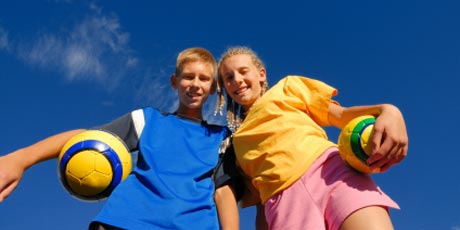Todd: So, Monica, you are actually a trained physical education teacher.
托德:莫妮卡,你是一名体育老师。
Monica: Yes, that's right.
莫妮卡:对,没错。
Todd: So, we often hear about how kids today are not fit, and they don't exercise enough. Do you think that's true?
托德:我们经常听到现在的孩子不健康这种说法,而且他们锻炼不足。你认为这是事实吗?
Monica: I think it is true, yes. I think kids these days spend a lot more time on the computer than they used to, so of course that means less time outside and getting fit.
莫妮卡:我认为这是事实。我认为与以前相比,现在的孩子们在电脑上花费的时间太多了,所以他们在户外锻炼的时间就减少了。
Todd: Now, in some countries there's a big debate about how much fitness kids actually do in school, so in your country, in New Zealand, do kids still do a lot of fitness actually in school?
托德:一些国家就孩子们在学校进行了多少体育锻炼进行了激烈的讨论,那在你的祖国新西兰,现在孩子们还会在学校进行大量体育活动吗?
Monica: Well, recently the P.E. curriculum got amalgamated with the health curriculum, so P.E. and health were considered to be important in school, and the health side of the curriculum is often taught in the classroom, and of course the P.E. side often taught outside the classroom, and there's always debate about how much kids should be doing inside school. In fact very recently, now that it has become quite a big problem in New Zealand for teenagers, there has been talk about increasing the number of P.E. lessons that students have, but the current Prime Minister I think believes that the emphasis should be put on out-of-school activities like clubs and encouraging students to become more involved in that side of things.
莫妮卡:最近体育课程与健康课程相结合,体育和健康被认为是学样的重要课程,课程中的健康部分通常在教室里教授,当然体育课是在户外进行,其实有关学生应该在学校里进行多少运动一直存在争议。实际上,不久前这对新西兰青年一代来说已经成为了主要问题,有关增加学生体育锻炼强度的建议一直存在,但是现任新西兰总理认为,重点应该是进行像俱乐部那样的课外活动,鼓励学生多参加课外活动。
Todd: What do you feel? Do you think it should be?
托德:你怎么看?你也这样认为吗?
Monica: I actually agree to be honest, because I think if you increase the number of P.E. lessons that students have in a week, it doesn't actually necessarily increase their motivation to be involved in physical activity, but if like he's suggesting, you increase the opportunities outside of school, students maybe become involved in a sport that they choose, that they'd like to do and they hopefully can take it on as a lifetime sport. Yeah, which is important.
莫妮卡:说实话,我同意这种观点,因为如果增加每周体育课的课时,这其实不会提高学生参加体育活动的动力,不过如果像总理建议的那样,增加学生参加课外活动的机会,学生可以自行选择他们喜欢的体育运动,他们可能会一生都坚持进行这项运动。我认为这点很重要。
Todd: But wouldn't the counter argument be that only kids that have a natural inclination to play sports would want to join those clubs and if the kids that are more sedentary or don't enjoy physical activity won't join a club, so you need to actually make them do fitness at school?
托德:反对观点是不是认为,只有孩子们有从事体育运动的意愿才会想加入运动俱乐部,如果有学生更习惯于久坐,不喜欢进行体育运动,那他们就不会加入运动俱乐部,所以要让孩子们在学校进行锻炼。
Monica: Yeah, that's true. That is a counter argument, and a very good one... to argue on some other occasion. Of course I can talk about that side of the argument as well if you want me to.
莫妮卡:对,你说的没错。这的确是反对观点,这是在其他场合也提出来的一个很好的观点。当然我可以谈谈这个方面,如果你希望我说的话。
Todd: No, it's Okay. Basically, you saw there's... both sides make a good point.
托德:不用了。基本上来说,双方观点都有道理。

译文属可可原创,仅供学习交流使用,未经许可请勿转载



